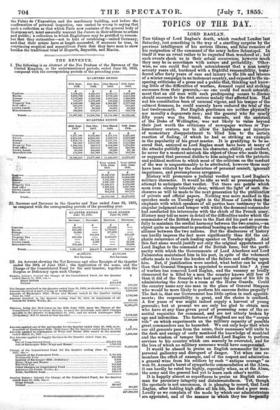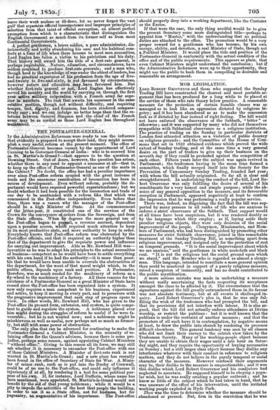TOPICS OF THE DAY.
LORD RAGLAN.
DIE tidings of Lord Raglan's death, which reached London last Saturday, lost something in the way of a startling surprise by the previous intelligence of his serious illness, and false rumours of his resignation of the command of the army before Sebastopol. In itself it was an event rather to be expected than wondered at ; but such events shock us in their actual occurrence, however much they may be in accordance with nature and probability. Other- wise, no one could feel much astonishment that a man nearly seventy years old, burdened with a frightful responsibility-' trans- ferred after forty years of ease and luxury to the life and labours of a winter campaign in an inclement country, and exposed to the un- sparing criticisms of a press and a public that, thinking and know- ing little of the difficulties of warfare, demand rapid and striking successes from their generals,-no one could feel much astonish- ment that an old man with such predisposing causes to &sense' should succumb to the first serious malady that erected him. Had not his constitution been of unusual vigour, and his temper of the calmest firmness, he could scarcely have endured the trial of the: last twelvemonth. But English gentlemen are neither physically nor morally a degenerate race; and the general who for nearly fifty years was the friend, the comrade and the assistant of the Duke of Wellington, was not likely to value beyond their just worth the criticisms of newspaper writers or Par- liamentary orators, nor to allow the harsUess and injustice of momentary disappointment to blind him to the certain reaction of feeling, of which he had so striking an example in the popularity of his great master. It is gratifying to be as- sured that, annoyed as Lord Raglan must have been at many of the attacks publicly made upon his character, ability, and conduct, he never for a moment mistook the object of those who made them, or supposed that personal dislike to him mingled with the patriotic • and political motives to which most of the criticism on the conduct of the war is unquestionably to be attributed, however these may• have been vitiated by the admixture of personal conceit, ignorant impatience, and presumptuous arrogance. History will pronounce a judicial verdict upon Lord Raglan's military character. It would be idle as well as presumptuous to attempt to anticipate that verdict. Yet there are points which seem even already tolerably clear, without the light of such dis- closures as will be made to the next generation by the publication of private and official papers. Nothing was more marked in the speeches made on Tuesday night in the House of Lards than the emphasis with which speakers of all parties bore testimony to the singular judgment and temper with which the deceased commander had conducted his intercourse with the chiefs of the French army. History may tell us more in detail of the difficulties under which the commander of the British forces in the East did his part so success- fully to maintain the cordial harmony between the two armies,---en object quite as important in practical bearing as the cordiality of the alliance between the two nations. But the disclosures of 'history can hardly impress the fact more significantly than did the em- phatic recurrence of each leading speaker on Tuesday night. And this fact alone would justify, not only the original appointment of Lord Raglan to the command of the British force but the perti- nacity with which the Governments of Lord Aberdeen and Lord Palmerston maintained him in his post, in spite of the vehement efforts made to throw the burden of the failure and suffering upon him. But, if justification were needed, what better can be urged than that General Simpson is appointed to succeed him ? A year of warfare has removed Lord Raglan, and the vacancy so loudly clamoured for is filled by a man the country knows still less of than it did of the General who had spent the prime of his life in administering the Army in a room at the Horse Guards. Could the country name any one man in the place of General Simpson, who would be more likely to perform his onerous duties properly? The fact is, that our Government has little option in such appoint- ments; the responsibility is great, and the choice is confined. A few years of war might indeed supply a harvest of young generals ; but at present we are only too glad to obtain men who have at any time given proof of possessing some of the es- sential requisites for command, and are not utterly broken by age and infirmities. The fortunes of England are not the "corpus vile" on which experiments on the military capacity of possible great commanders can be hazarded. We can only hope that when our old generals pass from the scene, their successors will unite to the dash and energy of early manhood the knowledge of mankind and the wisdom of temper that enabled Lord Raglan to perform services to his country which can scarcely be overrated, and for the loss of which no military successes would have compensatlid.
It would be absurd to praise an English commander forinere personal gallantry and disregard of danger. Yet when one re- members the effect of example, and of the respect and admiration a general wins from his soldiers by such "antique courage" as won St. Arnaud's burst of sympathetic commendation at the Alma, it can hardly be rated too highly, especially when, as at the Alma, the army and the general had yet to learn each other's mettle.
It is happily almost as superfluous to praise an English states- man for pecuniary integrity and disinterestedness. Yet, though the spectacle is not uncommon it is pleasing to record, that Lord Raglan, after holding. high office all his life, has died a poor man. Loudly as we complain of the mode by which our admWstraters are appointed, and, of the manlier in which they too fzeptently
leave their work undone or ill-done, let us never forget the vast gulf that separates official incenipetence and improper principles of selection from that taint of official corruption, an almost perfect exemption from which is a characteristic that distinguishes the English Government as much from its former self as- from most Continental Governments.
A perfect gentleman, a brave soldier, a pure administrator, dis- interestedly and nobly abandoning his ease and his habitual com- forts at a time of life when these become to most men necessities; Lord Raglan has fallen a victim to his patriotism and his dap. That history Will award him the title of a first-rate general, is perhaps improbable. Nature, education, and circumstances, have seldom combined to produce first-rate generals; and a man who, though bred to the knowledge of war under the ablest of leaders, has had no Practical experience of his-profession from the age of five- ancl4wenty to. five-and-sixty, is not favoured by circumstances, however nature and education .inay have favoured him. But whether first-rate -geueral or not, Lord Raglan has effectively served his Country and the world by carrying on through the first year .aetive military cooperation_ with a French array far supe- rior in numbers. The task that awaits his successor in the same- relative position, though not without difficulty, and requiring temper, tact, dignity, and firmness, has been rendered compara- tively easy; and we can indulge no better hope than that the re- lations. between_ General Simpson and the -chief of the French army. May be- us cordial as those Lord Raglan has throughout maintained.



























 Previous page
Previous page